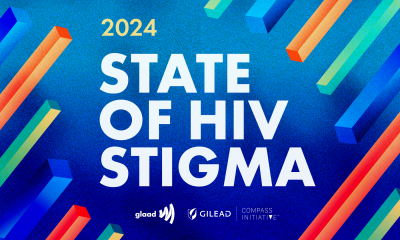Local
Smoking comeback is colorful and 2x deadlier
OUT Against Big Tobacco Coalition exposes targeting of LGBT community
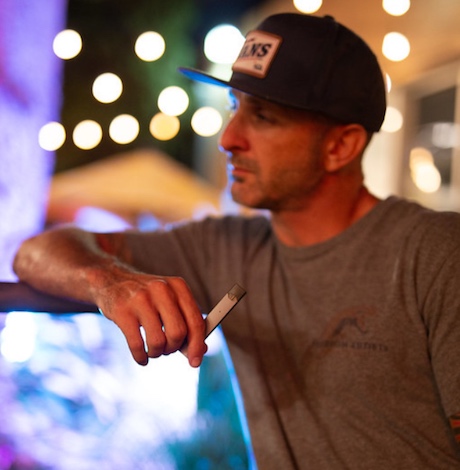
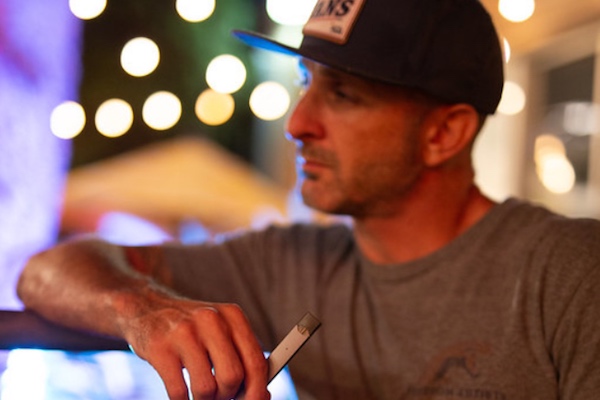
Model advertising e-cigarettes, sponsored by Black Note Tobacco.
Nothing seemed quite as cool as the way Bette Davis and Humphrey Bogart elegantly manipulated their cigarettes in classic black and white films like “Jezebel” and “Casablanca.” In the 1950s, James Dean depicted smoking as rebel cool in “Rebel Without a Cause,” as did John Travolta in “Grease” in the 1970s, prompting thousands of young people to pick up the habit, become addicted and inject millions of dollars into the coffers of Big Tobacco.
The industry undermined the 1971 ban on advertising of tobacco products on TV by creating product placement embedded in the shows. And Big Tobacco CEOs brazenly testified before Congress that nicotine was not addictive, knowing their own research showed otherwise, as revealed by the 1998 Master Settlement Agreement with the suing states attorneys general.
But Big Tobacco greed requires a constant supply of new recruits. Confidential Settlement records and research by the American Legacy Foundation revealed Project SCUM (Sub-Culture Urban Marketing), micro-targeting of minorities and gays through direct and indirect advertising, community outreach, and sponsorships, which the LGBT community did not recognize as market manipulation.
The stealth and public campaigns succeeded and tobacco use skyrocketed, contributing to significant health disparities between LGBT smokers and general public smokers. But the gradual shift of cultural attitudes and the municipal restrictions on smoking areas started stripping away the veneer of coolness to posit smoking as a stinky, dirty bad habit.
But greed dies hard and Big Tobacco has been making a comeback, on screen and in the LGBT community. According to the CDC, PG-13 movies targeting youth went 62% without featuring tobacco since 2017. However, a 2018 report of tobacco-related incidents per PG-13 movie went up 34% and “audience tobacco impressions delivered by youth-related films were 10.3 billion, up 103% from 2017.
As Equality California Institute and 17 other LA-based LGBTQ and health service providers point out in a new OUT Against Big Tobacco Coalition campaign, the tobacco industry is now capitalizing on innovative ways to ensnare new users through slick advertisements, sponsorships and coupons for cool new colorful and flavorful e-cigarettes. While consumers might think e-cigarettes are a way to break the cigarette habit or addiction, brands like Juul in fact deliver more nicotine and can be more harmful, according to three lawsuits filed against Juul since April.
“The Juul is a battery-powered device that converts liquid into a vapor, which the user inhales. It comes with prefilled cartridges called “Juulpods,” which have candy-like flavors, and a USB charger that pops into a cellphone charging block or laptop,” reports Buzzfeed News. “These features, which are supposed to make the Juul a ‘satisfying cigarette alternative’ for adult smokers, have also made it a hit among young people and nonsmokers. The long-term health effects of e-cigarettes like the Juul are not yet known, but nicotine has been long known as a highly addictive substance that can affect brain chemistry.”
“For too long, Big Tobacco has preyed on LGBTQ people, getting us hooked on their toxic products and profiting off our deaths,” Equality California Institute Executive Director Rick Zbur says in a press release. “We won’t let them take advantage of the most vulnerable members of our LGBTQ communities any longer. We look forward to exposing them for exactly what they’re doing to our community and taking every action possible to improve the health and wellbeing of LGBTQ people.”
The new campaign notes that “LGBTQ Californians are more than twice as likely to smoke as their non-LGBTQ peers, and nearly 30,000 LGBTQ people across the country die every year of tobacco-related causes.” Additionally, “estimates of smoking rates among LGBTQ youth range from 38 to 59 percent, compared to just 28 to 35 percent of youth generally.”
This is critical, Samuel Garrett-Pate, communications director of Equality California and the Equality California Institute, tells the Los Angeles Blade that unlike cigarettes, which that visibly burn down with use, a vaper cannot tell from the covered cartridge how much has been inhaled. There is no way to tell, therefore, how much mood-altering vapor is harming the brain and psyche, producing emotional outbursts, anxiety and potentially deadly depression.
The OUT Against Big Tobacco Coalition campaign is trying a kind of harm-reduction approach by not insisting that smokers and vapers stop now. Rather they are reaching out to teachers and GSAs to do trainings about Big Tobacco and building public support for restricting and controlling tobacco-related municipal policies. For instance, they want to restrict flavored tobacco products and ban the redemption of tobacco-related coupons that are often distributed at LGBTQ events such as Pride and Halloween.
“Tobacco companies reported spending $380 million on coupons in 2016 to offset the effects of tobacco tax increases, such as those imposed in the state of California in the aftermath of the passage of Proposition 56 in 2016,” increases that encourage smokers to quit, the Coalition says. Several cities, including New York City and Chicago, have passed redemption restriction measures as a result.
The Coalition is starting in West Hollywood and the San Fernando with the intension of expanding the campaign to cities throughout Los Angeles County.
“There is still a lot of room to pass policies and make changes in our communities that will make it less likely that kids, teens and young adults will start smoking and easier for current smokers to quit,” Brandon Tate, Chair of the OUT Against Big Tobacco Coalition, said in the press release. “It’s really about activating and engaging people to take action and make our communities healthier.”
Arts & Entertainment
2025 Best of LGBTQ LA Finalist Voting
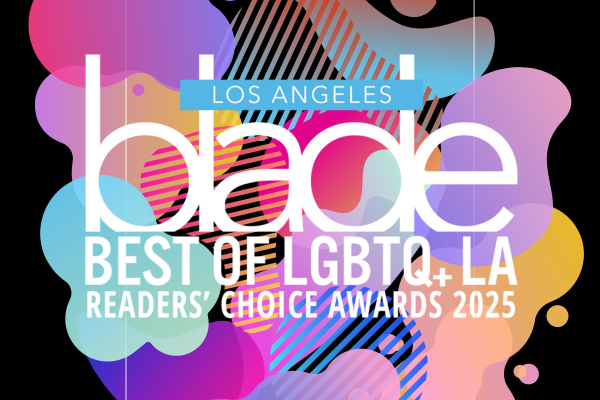
The 2025 Los Angeles Blade Best of LGBTQ LA Awards are here! You submitted your nominations—now it’s time to vote for the finalists. Voting is open through May 2, 2025.
Among some of your favorite categories are Best Drag Performer, Local Influencer of the Year, Best Happy Hour, Go-Go of the Year, Activist of the Year, Public Official of the Year, Best Musical Artist, Best Non-Profit, Best Bartender, Best DJ, Best Local Podcast, and so many more!
Winners will be revealed at the Best of LGBTQ LA celebration on Thursday, May 22 at The Abbey. Stay tuned for more party details coming soon!
Vote using the form below or by clicking HERE.
Local
‘Housing Now!’: Advocates plan to wrap City Hall in red tape
Advocates demand local government removes the red tape on housing resources

On Tuesday at 8 a.m., over 100 housing advocates from the AIDS Healthcare Foundation (AHF), Housing Is A Human Right (HHR) and the Los Angeles office of the National Coalition for the Homeless, will join together for a national day of action to demand “Housing Now” for the homeless community nationwide.
Housing advocates will gather in front of City Hall to wrap the entire perimeter of City Hall in red tape.
The ‘Stop the Red Tape Protest’ marks the first anniversary of when the Supreme Court of the United States ‘Grants Pass’ oral arguments. The Grants Pass decision in 2024 made it so that cities like Grants Pass and other ‘localities may impose criminal penalties for acts like public camping and public sleeping, without violating the Eighth Amendment — even if they lack sufficient available shelter space to accommodate their unhoused population.’
Since then, Grants Pass has been sued multiple times over ‘objectively unreasonable’ homeless ordinances that discriminate against people with disabilities.
“Seven people die on the streets of Los Angeles every day. Delays in bringing permanent housing online immediately through adaptive reuse and new construction are unconscionable,” said Susie Shannon, Policy Director for Housing is a Human Right. “The city response of breaking up encampments for the more than 45,000 people experiencing homelessness in the City of Los Angeles has led to individuals taking refuge in abandoned buildings and in places where services are scarce.”
A recent homeless count estimated that there around 45,000 homeless and unhoused Angelenos in the city.
According to AHF, the city is far behind in approving building permits and the creation of new and affordable housing units. The red tape and other bureaucratic issues were further exacerbated by the recent fires that affected large swaths of the city.
Features
New mayor Chelsea Byers, hopes to make WeHo a model city for others to follow
She has big plans, but can they withstand the Trump administration?

West Hollywood’s new mayor Chelsea Byers has lofty ambitions to make the 1.8-square-mile city, a model for other cities in the region.
She hopes to deal with compounding crises of housing affordability, traffic congestion, climate change and a new federal government that’s slashing programs and services many people – especially LGBTQ people – rely on.
But can Byers, who was elected to city council in November 2022 and selected as
mayor by council in January, really make a difference during her one-year stint in the
city’s top job?
Byers believe she can.
On one of the biggest challenges facing West Hollywood residents – housing
affordability – Byers fully embraces more housing development.
“For 80% of the city of West Hollywood including myself, who are renters, accessing a
home that is affordable is a very difficult thing. And the way that cities can address that
cost is frankly, by building more housing,” said Byers.
Byers also says she fully accepts the state’s regional housing needs assessment, which
assigned West Hollywood a target of building 3,933 new housing units in the next eight
years. That’s a tall order, given the city is currently only home to about 38,000 people.
“We’re going to have to look at this sort of invisible cap that we put across the town to
increase the capacity in a way that is equitable, that creates more opportunity for
different types of housing to be built. We wouldn’t want all of this rezoning to help us
lead to more one-bedroom apartments, when we know that the future of the city is also
accommodating more families,” said Byers, noting that queer families also struggle to find
homes in West Hollywood.
Those housing targets also dovetail with the city’s long-standing ambition to have
Metro’s K-Line extended through West Hollywood, Byers says.
But even if West Hollywood meets its targets, it’ll only be a small drop in region that
studies estimate needs to build more than 600,000 units of affordable housing. Still,
Byers says West Hollywood can lead by example and get buy-in from the other cities in
LA County to help solve the affordability crisis together.
“I believe that our values can be extended to these other places and help move them
actually in big ways,” said Byers.
Those values necessarily include West Hollywood’s historic diversity and inclusivity of
its LGBTQ+ and immigrant communities, both of which are feeling ill at ease from the
federal government’s attacks.
“I think it goes above and beyond the fear-mongering and outright assaults that the
current federal administration’s lobbying at the LGBTQ community. It’s the real
dismantling of funding and structures that existed at the federal level to enable a lot of
the social service programming that our LGBTQ community members rely on,” said Byers. “That is the biggest thing that we feel right now when I’m asked as a city leader,
how are we impacted?”
The city is responding to this looming threat through its own funding process.
“We’re at the start of a three-year cycle that determines how, which organizations, we
invest our $7.8 million social service budget. To have these two moments happening at
the same time gives the city a tremendous opportunity to step up to whatever extent we
can,” she said, noting that programs for sexual health care, HIV programs, and aging
in place are particular priorities.
“Part of what I’m doing is creating funding that is accessible and available in more rapid
ways than our three-year cycle. Because once the three-year cycle has closed its door,
then that is it. One of those tools is a micro grant program that is specifically dedicated
towards Innovative or programming that that is needed,” Byers said.
Part of the response is also ensuring that West Hollywood remains a beacon for LGBTQ
people not just in Los Angeles, but across the country and around the world.
“You’ll see us as the city not back down from our investment in programs like Pride
which are world-class events,” she said. “For us, this is the thing that matters. And
we’re willing to make the additional investments in the public safety resources to make
sure that it’s going to be a safe event.
“I think a lot of our community members have always felt like they are a target already,
and it hasn’t stopped anyone from doing their thing. In fact, if all eyes are watching, then
we better give them a good show, has been our attitude.”
Earlier this month, city council voted to officially designate the Santa Monica strip
between La Cienega and Doheny as the Rainbow District, with a dedicated budget to
improve and promote the area as a destination. The area will soon see new street pole, banners, utility wraps, murals, and the West Hollywood Trolley bus will have service
extended to Thursday nights to help promote business along the strip.
Byers says the city is also looking at reducing red tape around how business spaces are
licensed to help revitalize the area.
“We’ve often said that West Hollywood is a model for how it gets done,” said Byers. “It’s
such a beautiful moment for us to sort of pivot our focus locally and remind ourselves
that cities are about quality of life, and making sure that we can be an inclusive city.”
California
South Park provides green space to a predominantly Latino community
‘…the need for green spaces within Latino communities has never been greater, especially in South L.A.

South Park, one of the oldest parks in Historic South Central, has brought multi-generational Angelenos together for centuries.
The park sits at the intersection of 51st Street and Avalon Blvd, surrounded by some of the most socially, culturally and historically important locations in the country, including Central Avenue, site of the West Coast jazz scene in in the 30s and 40s, the former Black Panther Party headquarters in L.A and one of the epicenters of the Watts rebellion in 1965.
The park—also known as Barry White Park—was founded in 1899. Today, 126 years later, the park still stands—hosting weekend soccer games, señoras chismeando, recreational activities like swimming, card games among elders and city-led events.
The park was named after two-time Grammy Award winner and R&B singer Barry White, who grew up in South Central, just blocks away from the park.
As PBS initially reported, the City of Los Angeles purchased it from a private developer for $10,000. At that time it was not as big as it is now, but was always characterized by its tall palm trees.
The park is located in Los Angeles City Council District 9, where the population is predominantly Latino (79.9%). According to Park Equity, Life Expectancy and Power Building research, the need for green spaces within Latino communities has never been greater, especially in South L.A, where the landscape is often characterized by an overconcentration of liquor stores and a lack of quality and accessible recreational spaces. More than a century after the park’s opening, for many local residents, it is one of the only parks within walking distance for them.
Amanda Walker, 56, moved to L.A. from Chicago, Illinois. She said one of her favorite things to do at the park is to take in the sun.
“The sun falls perfectly anywhere through the park, that’s probably my favorite part,” Walker said.
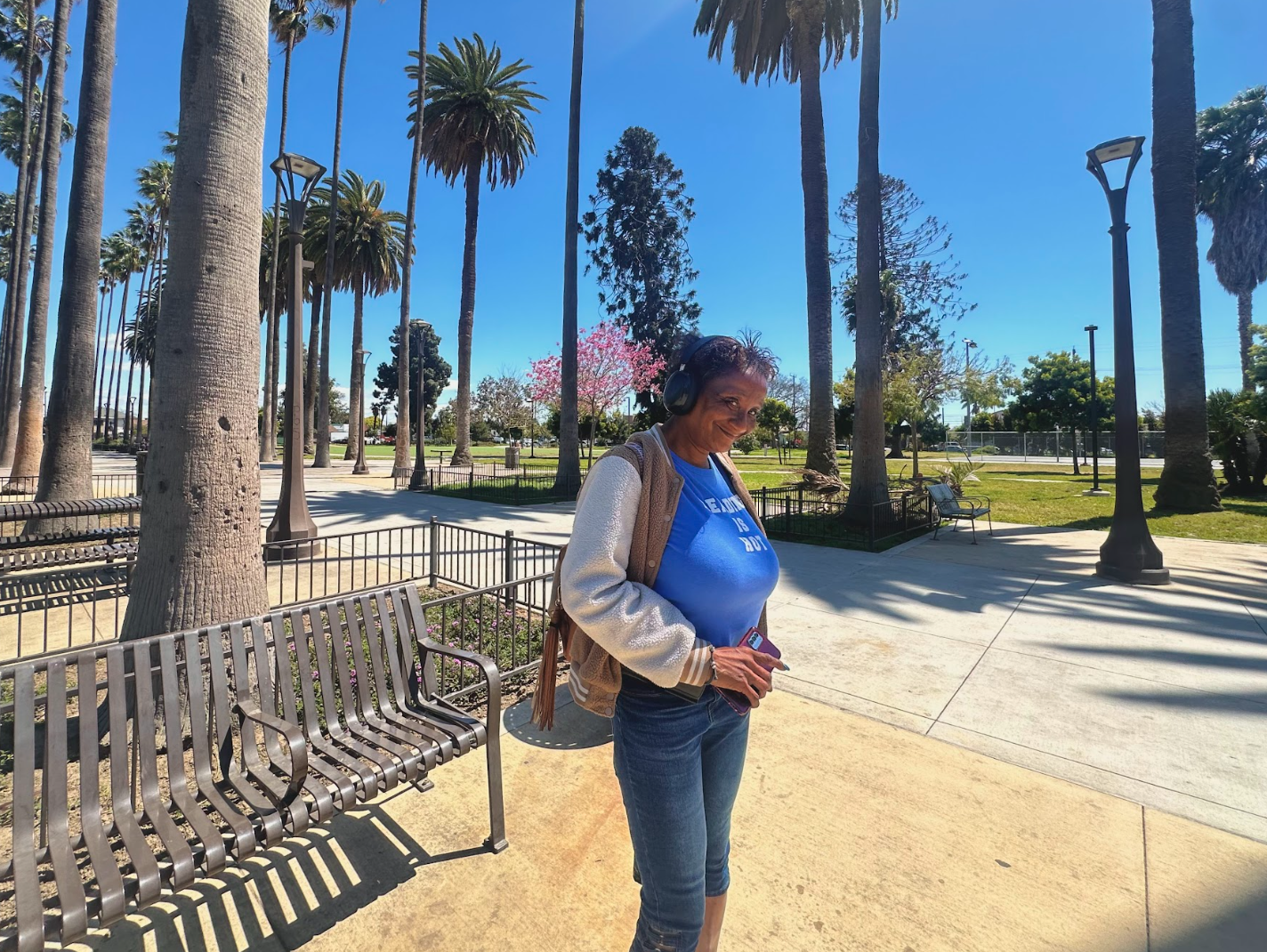
Amanda Walker at the park before meeting up with her friends. (Photo by Brenda Verano)
Walker said she loves coming to the park with her friends, who often use the park as a gathering place.
“I do wish there were more activities for adults,” she said. “The park has a playground for kids, and basketball courts… we need more things in the park for people like me.”
Maria L., 30, said she also comes to the park to be surrounded by nature. Although she lives in South Central, she said she does not have much free time to come as often as she would like.
“I haven’t been here in about eight months,” she said. Although she was alone, she was on a video call with her family where she was able to show them the scenery of the park and said she was surprised at how green and vibrant it all looked.
“I like coming here to just sit and hang out,” she said. She enjoys the sense of community she feels when being in the park. “Some people are walking their dogs; others are exercising or simply just laying down. It’s nice. I also like seeing the birds and the squirrels,” she said.
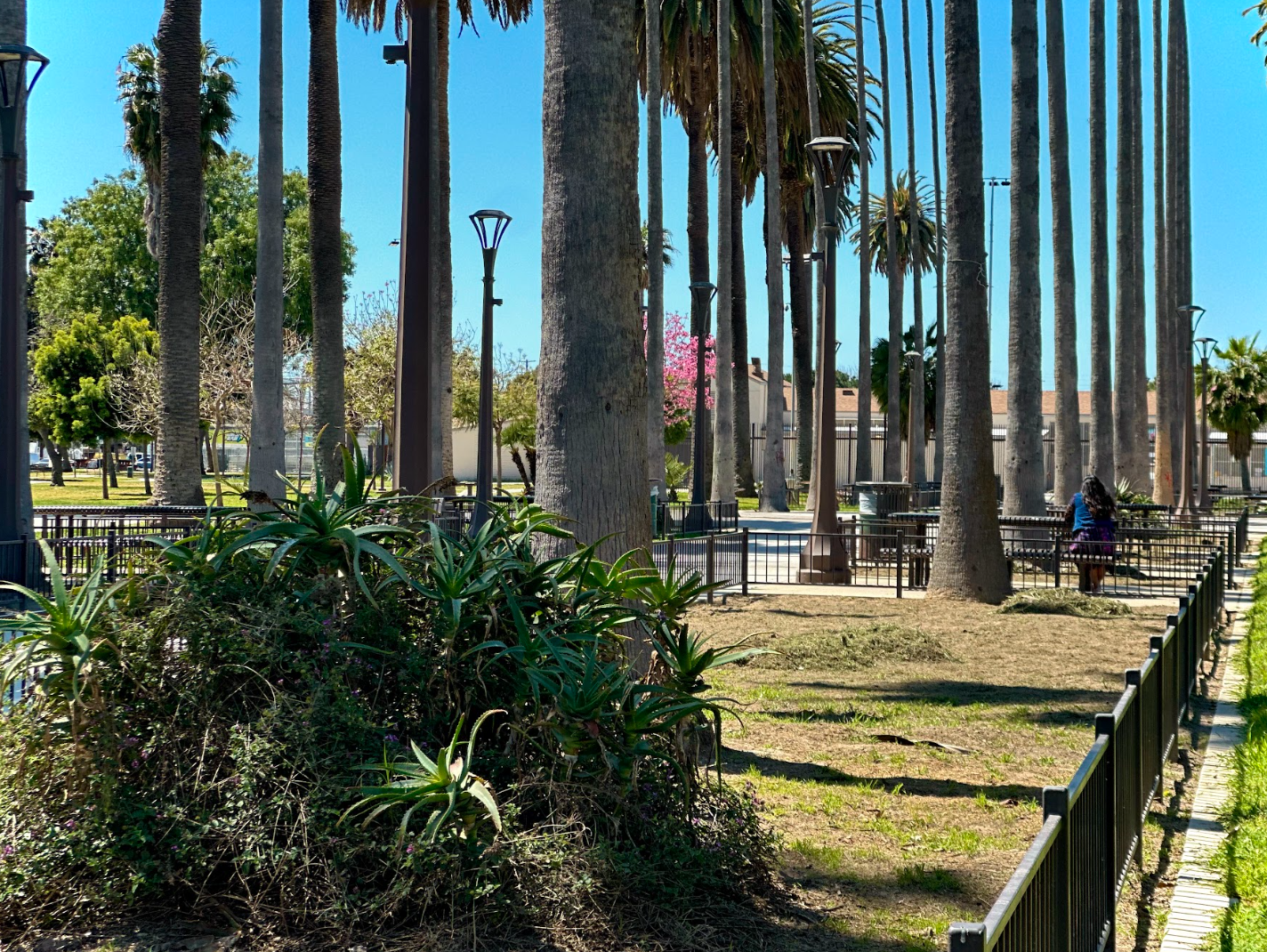
From a distance, Maria L. sits in the sun on the park benches. (Photo by Brenda Verano)
The relationship between access to parks and life expectancy are closely linked. Park deserts can have disastrous effects on residents as well as wildlife, as stated by a study conducted by the Prevention Institute in partnership with University of California, Los Angeles , the National Health Foundation, Community Coalition, Esperanza Community Housing Corporation and the Social Justice Learning Institute.
According to the research, South Central L.A. is considered to have “high park need” and “very high park need” neighborhoods, with an average of 1.6 and 0.7 acres of parkland per 1,000 residents, in comparison to the L.A. countywide average, which is 3.3 acres of parkland per 1,000 residents. The median life expectancy in South L.A. is 77 years, well below the level for the county as a whole. About 15 miles away, in the community of Beverly Hills, the life expectancy is about 90 years, 13 years higher.
South Central residents have been asking for more investment in parks and recreational facilities. In 2018, the 18.25-acre park went through a multi-million renovation, which allocated funding for the improvement of its gym, swimming pool, basketball and tennis courts, baseball diamond, outdoor stage, fitness area, picnic tables and children’s play area.
Despite the recent investments, the park has also been widely known for its gang and chrome activity, which the community says has been a direct effect of years of disinvestment and neglect.
In previous years, the Los Angeles Police Department identified the park as an area where gang activity—specifically from the Avalon Gangster Crips, Broadway Gangster Crips and 52nd Street Playboys—has been observed.
“The problem was scanned and revealed that this park, like many others in urban America, had slowly been neglected and overrun by criminal activity that revolved around gangs, narcotics and quality of life issues,” states the LAPD. “The analysis of the problem at the park was conducted by reviewing data, meeting with officers and receiving input from local community representatives and park staff members.”
Despite this, the community recognized the park as a long-standing historical entity of South Central L.A.
As one of the oldest parks in the city, South L.A. Park continues to be home to local residents, wildlife, street vendors, youth and all the great things that make up Los Angeles.
EDITORS NOTE: This article was published through the Bezos Fellowship grant provided by the Ethnic Media Services, which recently changed its name to American Community Media. The article was written by Brenda Fernanda Verano, an award-winning journalist who reports for CALÓ News, a local non-profit newsroom focusing on the Latin American community of Los Angeles.
Arts & Entertainment
LA Opera brings back Pride Night with a production of ‘Ainadamar’
Pride Night returns at the LA Opera

LA Opera is bringing back its Pride Night on Wednesday May 7, in partnership with the Opera League of Los Angeles.
LGBTQ members and allies will come together for Pride Night to indulge in a performance of “Ainadamar,” at the Dorothy Chandler Pavillion. The discounted tickets for Pride Night include access to a complimentary post-show party at Vespaio hosted by the Opera League of Los Angeles, featuring Cal-Italian bites from Chef Agostino Sciandri.
“Ainadamar” is a tribute to Spanish poet and queer icon, Federico García Lorca.
“This season, we celebrate with ‘Ainadamar,’ a powerful tribute to Spanish poet and queer icon Federico García Lorca. These pairings matter. They highlight that opera is a living, evolving art form—one that speaks to all people and reflects the diversity of the world we live in,” said Christopher Koelsch, president and CEO of LA Opera.
The central plot of “Ainadamar,” which is the Arabic meaning for ‘fountain of tears,’ follows Ana María Martínez as Margarita Xirgu, an actress who spent half of her career portraying Mariana Pineda, who was a 19th-century Spanish liberalist heroine, in Lorca’s play. Pineda was a political martyr who was executed for embroidering a flag with the slogan “Equality, Freedom and Law,” in protest of the absolutist Spanish regime.
The production, running at approximately one hour and 20 minutes, sets the stage with a throwback, recounting Lorca’s life and his last days in the Spanish Civil War.
“At the heart of our Pride Night celebration is the belief that everyone should feel seen onstage and off. Opera is a space for community and belonging, where our audiences can recognize themselves not only among fellow attendees, but also in our artists, our music and the stories we tell,” said Koelsch.
This major company premiere, led by resident conductor Lina Gonzáles-Granados, is sung in Spanish, with English and Spanish subtitles. Grammy-winning composer Osvaldo Golijov produces the dramatic, flamenco-inspired score that meets the poignant libretto by David Henry Hwang.
During the COVID-19 shutdowns, live performances at the LA Opera were put on hold and the journey to bring back Pride Night, among many other in-person performances, was a struggle filled with many moving parts.
“COVID-19 suspended live performances across the board and during our return season we were navigating the different timelines for audiences returning to live theater. It was very much a matter of listening to our community and learning what had changed for them as well as us: some opted for livestream options, others preferred only outdoor events, and so on,” said Koelsch. “Once we found our stride, we were excited to bring back Pride Night the following season during ‘The Marriage of Figaro.’”
This year the LA Opera is celebrating their 40th anniversary by launching their 40th Anniversary Campaign to raise resources needed to continue funding their organization.The show opens on Saturday, April 26 and runs through May 18. Purchase tickets by clicking here.
a&e features
Meet the chef who built his legacy in the LGBTQ+ community
He is an icon in the Hollywood culinary scene and a fierce ally in the LGBTQ community

Editor’s note: The interview with Chef Juan featured in this article was done in Spanish and translated accordingly for this article, but kept in its original format.
Juan Raigosa Chavez is the living embodiment of the American dream that many can only hope for. During his 40-year culinary journey, he was able to become a legal citizen and has enjoyed the privileges of living and working in Los Angeles for four decades.
Chef Juan migrated here from Zacatecas, Mexico in 1985 and since then he has worked his way up to his current position as one of West Hollywood’s most beloved chefs in the LGBTQ+ bar scene.
He started his journey as a dishwasher and through his hard work, dedication to achieving the American dream and meticulous work ethic, he was able to climb the ranks in the kitchen team hierarchy.
“Primero empecé lavando platos en 1985 en Marix Tex Mex [Café] en Hollywood. Y después me hice preparador, después me hice cocinero. Y luego me hicieron kitchen manager, primero de Marix y luego de Basix Café haciendo creatividad de menús, variedad de comida, y más,” nos dice Chef Juan. “Me mandaron a las mejores escuelas culinarias de San Francisco pagados por la dueña de Basix.”
“First, I started washing dishes in 1985 at Marix Tex Mex [Café] in Hollywood. Then, I was promoted to food prep, then kitchen cook. Finally, I became kitchen manager—first at Marix and then an Basix Café—creating menus and a variety of dishes,” said Chef Juan. “[The restaurant owners] sent me to the best culinary schools in San Francisco, all paid for by the owners.”
Chef Juan was living the American dream and had worked very hard to get to the position he was in when Covid-19 hit and many restaurants, including both Marix and Basix were forced to close. As of earlier this year, it seems like Marix Tex Mex Café is apparently set to re-open at the same location, while the location Basix was in, is still up for lease.
WeHo times first reported that workers have been adding finishing touches to the exterior of the building, but the significant delay in re-opening is due to extensive water damage that happened while the location was closed.
“Mucha gente lloró, porque teníamos más de cuarenta personas a mi cargo allí,” recalls Chef Juan.
“A lot of people cried because there were over forty people who worked under my leadership during that time,” said Chef Juan.
He was laid-off for two years and then when he stopped receiving federal assistance, he uploaded his resume online and the previous owners of GymBar WeHo, immediately called him up to hire him as their chef.
During his time at Marix and Basix, he says he gained a lot of valuable experience and gained a deep respect for the rich and diverse community of Hollywood.
Within three days of uploading his resume, he was hired.
“No duraron ni tres días cuando ya estaba contratado por que, como te dire–me hice un poco famoso,” Chef Juan tells the Los Angeles Blade. “Muchos de la ‘community’ me reconocen.”
“Not even three days passed until I was fully hired, because how do I say this? I guess I got a little bit famous,” Chef Juan tells the Los Angeles Blade. “A lot of people in the community recognize me.”
At that moment, a patron from the restaurant kindly interrupted the interview to say goodbye to Chef Juan and thank him for the food.
“Si ves, siempre me saludan porque me conocen y saben quién soy,” nos dice Chef Juan.
“See? People always say hello to me because they recognize me and know who I am,” Chef Juan tells us.
He also tells us that many people who know that he started working at GymBar have asked him to recreate some of his famous dishes from when he worked at Marix and Basix.
Chef Juan says his favorite part about working in a kitchen is his ability and freedom to create new dishes and elevate recipes that have always been staple dishes in his life and culture.
Due to his heartwarming attitude, friendly face and incomparable work ethic, he is now a sought-after chef and iconic member of the Hollywood community.
“Bastante gente me ha buscado desde que empecé aquí,” said Chef Juan.
“Plenty of people have looked for me here since I started,” said Chef Juan.
When asked how he wins over new customers, he said he likes to start off by asking customers what their favorite dishes are and then he builds on that until he’s able to find something that they are excited to try.
He spoke passionately about how much he loves to win over new customers and continue to impress his loyal customers. He says that to avoid mistakes, he likes to personally train each person who works under him, saying this is how he ensures the quality of the food is consistently to his standards.
“Es hacer las cosas con amor—porque cuando estás enojado no te va a salir bien—la comida te sale perfecta,” said Chef Juan.
“It’s about doing everything with love so it comes out perfect, because when you’re angry, nothing will taste right,” said Chef Juan.
It goes without saying that he is an icon and when we asked him how he felt about his entire career and legacy being built around the LGBTQ+ community of West Hollywood as a Latin American person, his answer was heartwarming.
“I love my people of West Hollywood, my neighborhood and for me it’s all normal,” said Chef Juan in both English and Spanish. “For many people, I understand it’s scary, but I understand [them] and I love my people no matter what they do.”
Chef Juan continues his legacy as he celebrates his 40th year, now working at WeHo’s GymBar, which is run by one of the Dodgers executive’s, along with his husband. As an avid Dodger fan, Chef Juan has also had the opportunity to participate in cooking demonstrations led by chefs at Dodger Stadium. GymBar WeHo is actually one of the only other locations in LA—other than Dodger Stadium that sells the authentic Dodger Dog.
Now that baseball season is underway, Chef Juan invites everyone in the nearby communities to join them for a game and a Dodger Dog.
Local
New chapter: P3 Theatre Company moves to Los Angeles
P3 Theatre Company, a long-standing staple in Long Beach’s theatre scene, has officially relocated to Los Angeles.

P3 Theatre Company, a long-standing staple in Long Beach’s theatre scene, has officially relocated to Los Angeles. While the company remains close to its Long Beach roots, this move signals a fresh chapter and opportunity to connect to a broader audience.
Jon Peterson, Executive Director and Founder of P3 Theatre Company, discusses the transition.
“After the pandemic lifted, the venue we were renting in Long Beach was no longer available to us,” explained Peterson. “After some time, we decided to look in the Greater Los Angeles area. There are so many great venues available, and there’s definitely a huge demand for the arts.”
P3 Theatre’s first major production in Los Angeles will be “Day After Day” (The Life and Music of Doris Day), a sentimental and nostalgic celebration of the legendary singer and actress. The choice to revive this show was intentional — it was P3’s last production before the Covid-19 shutdown.
“‘Day After Day ‘ was a very successful production,” said Peterson, noting that it earned Deborah Robin the Best Performer in a Musical title at the Orange County Theatre Guild Awards. “It’s such an endearing show with tons of recognizable music and the dynamic story of Doris Day.”
While dazzling performances are integral to P3’s mission, the company is equally committed to community outreach. Peterson emphasized that the move to the West Hollywood and Hollywood areas, offer opportunities to collaborate with other nonprofits and expand access to the arts for marginalized groups.
“There is a huge demand for the arts in this region,” said Peterson. “We look forward to bringing shows that audiences are excited to see, as well as introducing new works that will enhance their theatrical experience.”
One of P3’s signature initiatives is P3 Educates+, a program designed to provide performing arts workshops to underserved communities. Catering to all ages – which Peterson describes as 0-100+ – the workshops include improvisation, acting, and singing.
“It provides more than just an education of theatre,” Peterson explained. “[It provides] a level of entertainment that marginalized communities may not have an opportunity to experience otherwise.”
Supporting LGBTQ+ stories and artists is also a core priority for P3 Theatre Company. Peterson highlighted the company’s commitment to producing both new LGBTQ+ works and celebrated classics.
“Our stories need to be told and heard,” Peterson emphasized. “What better way to do so than through the arts?”
Among P3’s proudest achievements are the world premieres of two acclaimed works by playwright Jiggs Burgess. The Red Suitcase won the prestigious Del Shores Playwright Competition, while Wounded earned multiple awards at the Hollywood Fringe Festival in 2023. The latter’s success secured an off-Broadway run at Soho Playhouse in New York City, with performances continuing in 2024 and 2025.
P3 Theatre Company has ambitious long-term goals for its future in Los Angeles. Peterson hopes to build a strong audience and donor base while eventually securing a permanent performance space.
“P3 Theatre Company’s long term goal is to grow a solid audience and donor base in Los Angeles – and to find ‘the perfect theatre’ to hang our hat in.” Peterson said. “It is our plan to call Los Angeles our home and to continue to produce professional theatre in a community where theatre is thriving.”
For those eager to experience P3’s return to the stage, tickets for Day After Day (The Life and Music of Doris Day) are now available. As Peterson says with confidence, “We know the audiences will love it!”

For more information about P3, head to www.p3theatre.biz
Events
Q Con 2025 taking place in West Hollywood, offering free admission
Reserve your free tickets at the Q Con website!

Q Con, SoCal’s only LGBTQ+ comic convention, is set to return Saturday, May 3, bringing in dozens of LGBTQ+ speakers, vendors, artists and community voices to their lineup.
“LGBTQIA+ people of all ages and backgrounds need to see themselves and their stories represented in the arts – to know they are okay, they are accepted and they are powerful. Q Con gives us the opportunity to do this – to raise queer voices in comic books and graphic novels, bring the community together and have a lot of fun at the same time,” said Ted Abenheim, president of Prism Comics.
Mark your calendars and start scheming up your queer cosplay outfits for a costume contest that celebrates the LGBTQ+ representation and visibility in one of the most queer-coded industries in media ahead of Pride month.
Prism Comics, the nonprofit organization championing LGBTQ+ representation and diversity in comic books, graphic novels and pop media, announced their 4th annual Q Con, happening in West Hollywood’s Plummer Park. The convention will take place in West Hollywood from 11AM to 6PM at Fiesta Hall.
The nonprofit established in 2003, is deemed the “LGBTQ+ Comics Central,” at San Diego Comic Con, WonderCon Anaheim, Los Angeles Comic Con and other conventions. Prism prides itself on providing a safe space for the LGBTQ+ community to unite over mutual passion, interest and love for comics, novels and more. This is the space where comic creators, readers, librarians, educators and families can come together and celebrate, discuss and enjoy the representation the community needs and deserves.
Find free tickets and more information regarding guest speakers, panels and vendors here.
Q Con is also currently seeking LGBTQ+ comic creators and businesses who are interested in setting up a table at the event. If interested in tabling or volunteering, email Ted Abenheim, President of Prism Comics at [email protected].
California
Running, racing, dodging: Janelle Kellman on her bid to be California’s next Lieutenant Governor
Kellman says that she wants to use the position to tie together responsible growth and addressing the affordability crisis

Janelle Kellman is used to running marathons, which comes in handy as she campaigns to be
California’s next Lieutenant Governor – a campaign she began in 2023 for an election
that won’t happen until November 2026.
“The secret to being a true runner is consistency and discipline,” she says. “Nobody will
outwork me. I am not career politician. I am somebody who is gonna roll up my sleeves
and do all of the hard work.”
If she wins, the environmental lawyer and former mayor of Sausalito will make history
as the highest-ranking LGBTQ person elected to statewide office in California. But Kellman says she’s no climber. She’s putting a large stock of her campaign on the fact that she’s not a Sacramento insider and she’s not planning to use the job as a springboard to some other, more high-profile job.
“Many people run for this position because they want to be something else. I’m not
trying to be something else. Actually, I really want to do this job,” Kellman says.
The Lieutenant Governor sits on the boards of all of California’s higher education
institutions and has a significant role in natural resources and economic planning
through membership on the State Lands Commission, Coastal Commission, and
Commission for Economic Development.
Kellman says that she wants to use the position to tie together responsible growth and
addressing the affordability crisis that has seen hundreds of thousands of people leave
the state.
“There’s three things we really need to be focusing on to address affordability crisis.
Number one more housing of all types. Number two, proper public safety policies and
keeping our families safe. And number three, better mental health programs, both to keep people off the streets and address the homelessness problem and to support our
children,” she says.
Meeting these challenges will require someone who can ensure that many different
parts of California’s government – from the education system, the housing approvals
process, to the legal system, the heath care system and more – are laser focused on
bringing down the cost of living, Kellman says.
“I’m a lifelong team sport athlete and I’ve always been the captain of all the sports, and I
see [being Lieutenant-Governor] very much as a unifying collaboration type role, right?
This is a role I specifically want because I like that dynamic. I am really drawn to the opportunity to bring experts together.”
Kellman is aware of the symbolism her serving as Lieutenant Governor as a queer
woman would have in 2025.
“Our rights are under attack nationwide, and I see it as more important than ever that
California continue to be a stronghold of equity and inclusion,” she says. “To have
somebody who represents a minority community at the helm of our government really
gives visibility to our issues and reinforces that Californian is a place that values equality
and inclusion.”
Still, on one of the thornier issues of queer inclusion, Kellman is noticeably aversive.
She was quick to scold the Gov. Gavin Newsom when asked to comment on his recent podcast where he mused that trans women competing in women’s sports was “deeply unfair.”
“I hope that he would aim to represent all members of the State of California. So, I
hope he continues to govern and not just have a podcast for the next couple of years,”
she says. “But it’s also an opportunity to remind voters and remind everybody, it’s much more than that. It’s about inclusion. It’s about education. It’s about mental health and wellness.
There are so many issues that affect people Nationwide and Statewide. We’ve got to
stay focused on the big picture.”
But does that mean that she would advocate for trans women athletes being able to
compete in women’s sports, particularly as the lieutenant governor has a role in higher
education, where this issue has been in focus?
“I think the role of the Lieutenant Governor as an individual who sits on many of these
boards is to ensure that all students are treated fairly, and all our young people feel safe,
whoever they are on college campuses. I think that is the number one. No matter your background, no matter your orientation. So I would apply that across the board to anybody on college campuses,” she says.
Given one more chance to clarify her position, Kellman dodges again.
“I think that we have bigger issues to be talking about in the United States and
California,” she says.
But Kellman is critical of the Democratic political establishment that has entrenched
itself in Sacramento, which she characterizes as impeding progress on California’s most
critical issues.
“We’ve become an obstructionist party, and we need to be a party that gets things
done,” she says. “I’ve been able to get a lot done even as a small town mayor, and I see
my fellow mayors be able to get things done at the local level, I want to raise that up so
that it happens statewide.
“Let’s be the party that gets things done. And let’s focus on this high cost of living first
and foremost,” she says.
Without invoking the specter of the word “efficiency” in today’s political climate, Kellman
is also eager to hold the establishment to account for solving the state’s problems.
“Where’s the accountability? Where’s the transparency? What is happening in real
time? Let’s take homelessness, right? We know that as a state from 2017-18 to now, we
spent 22 billion dollars on homelessness. And during that same time period, the number
of unhoused in California went up by a third. Now, what if we were actually demanding
accountability and transparency along the way?”
And she’s eager to hold herself to account in office, too.
“If this was the private sector, I’d get hired. Because we would say you know how to do
the job, you’re going to be held accountable. We need more of that.”
California
Two anti-trans bills fail to advance in California
AB 89 and AB 844 were aimed at banning trans women and girls from competing in women’s sports
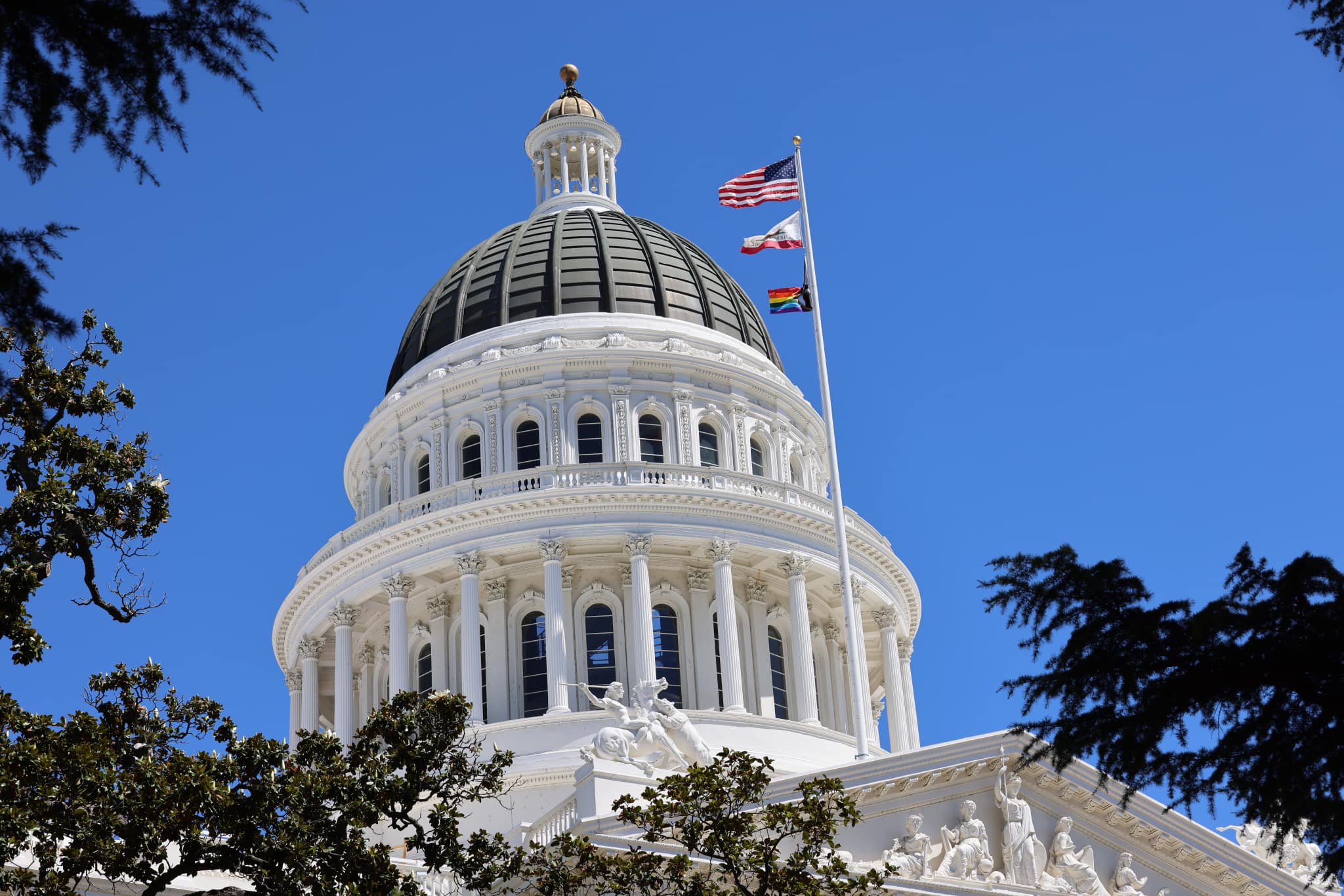
The two bills introduced by Republican lawmakers aimed at banning trans athletes from female sports, did not pass during yesterday’s committee meeting.
Assembly Bill 89 and Assembly Bill 844, have failed to advance in the Arts, Entertainment, Sports and Tourism Committee on Tuesday by a 2-6 vote on each bill. AB 89, introduced by Assemblymember Kate Sanchez (R-Rancho Santa Margarita) and AB 844, introduced by Assemblymember Bill Essayli (R-Riverside), were both rejected by California lawmakers.
“If these members and their counterparts were truly committed to addressing the inequities and safety concerns women and girls face—in sports and everyday life—they would be joining the frontlines in the fight for equal pay, stronger protections against domestic violence and sexual assault, and expanded healthcare resources,” said Tony Hoang, executive director at Equality California.
AB 89 and AB 844 are part of the nationwide coordinated effort led by extremists in Washington D.C. to sow fear and misinformation about transgender people—in particular youth—and attempt to erase them from virtually all areas of public life.
“Instead of tackling the real problems in our state like high inflation and rising healthcare costs, Assemblymembers Sanchez and Essayli continue to waste time and taxpayer money using transgender youth as political pawns in a shameful display of divisive politics and a thirst for attention.,” said Hoang.
AB 89 would have established a ban on athletes whose sex was assigned male at birth, from competing on a girls’ interscholastic sports team.
AB 844 would have reversed California’s law which currently allows trans athletes to participate in girls and women’s sports teams across all age levels, up to college level.
Tuesday’s hearing marked the first public debate on the issue in California since Newsom’s public comments about trans women in sports being “deeply unfair.”
On Friday, Gov. Newsom’s office confirmed it received a letter from U.S. Education Secretary Linda McMahon, stating that California could lose federal funds if it continued to allow trans athletes to compete in women’s and girls’ sports.
“As Secretary of Education, I am officially asking you to inform this Department whether you will remind schools in California to comply with federal law by protecting sex-separated spaces and activities. I am also officially asking you to publicly assure parents that California teachers will not facilitate the fantasy of ‘gender transitions’ for their children,” she wrote in the letter.
Equality California continues their partnership with the Legislative LGBTQ+ Caucus and other legislative partners in an effort to combat the passage of bills like AB 89 and AB 844.
“We are pleased these bills have failed and are thankful to those lawmakers who opposed this dangerous legislation in committee, particularly to the committee chair, Assemblymember Chris Ward, for his leadership,” said Hoang.
-
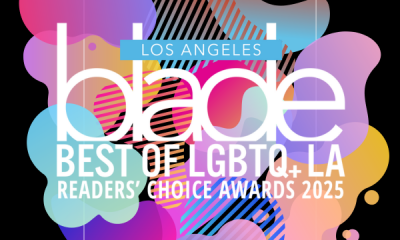
 Arts & Entertainment12 hours ago
Arts & Entertainment12 hours ago2025 Best of LGBTQ LA Finalist Voting
-

 Movies5 days ago
Movies5 days agoHeartfelt ‘Wedding Banquet’ remake a romcom worth seeing
-

 Brazil5 days ago
Brazil5 days agoUS lists transgender Brazilian congresswoman’s gender as ‘male’ on visa
-

 opinions4 days ago
opinions4 days agoOver 36,000 Angelenos unite for ‘Fighting the Oligarchy’ rally
-

 Congress4 days ago
Congress4 days agoEXCLUSIVE: Garcia demands answers on deportation of gay Venezuelan asylum seeker
-

 Books3 days ago
Books3 days ago‘Pronoun Trouble’ reminds us that punctuation matters
-

 Theater3 days ago
Theater3 days ago‘The Broadway Cage Match’ ready to rumble at WeHo’s Musical Mondays
-
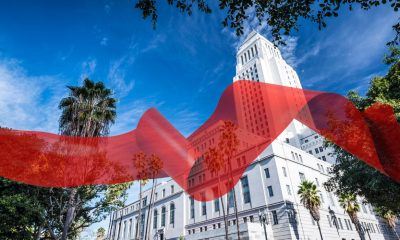
 Local15 hours ago
Local15 hours ago‘Housing Now!’: Advocates plan to wrap City Hall in red tape
-

 Features4 days ago
Features4 days agoNew mayor Chelsea Byers, hopes to make WeHo a model city for others to follow
-

 The Vatican19 hours ago
The Vatican19 hours agoPope Francis dies at 88



